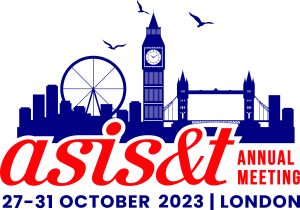The iFederation@ASIS&T AM 2023
October 23, 2023
10:00 AM - 11:30 AM EDT (Find your time here.)
Free to all members of ALISE, ASIS&T, and iSchools.
Discovery or Disruption? Debating the Effect of AI on the Information Professions
Many industries are examining how the introduction of AI technologies is changing their landscapes. The information professions are at the unique juncture of having had a hand in developing these technologies and having the foresight to see what these technologies mean for the future of the information profession.
Join us for an informative, interactive, and entertaining session that will explore these issues in a debate format. Our session of innovative AI thought leaders will provide spirited responses to the exploration of whether AI is a tool of discovery or an instrument of disruption. Key questions in the debate include: Does AI affect information integrity? Is AI so dangerous to the information professions and research that it must be legislated? Is AI so beneficial to discovery in the information professions and research that it should be unfettered? The session is moderated by Dr. Chirag Shah.
Participants
Moderator: Chirag Shah, University of Washington
Debaters:
- Michael Seadle, iSchools
- Lynn Connaway, OCLC
- Sarah Bratt, University of Arizona
- Ken Fleischmann, University of Texas at Austin
- Lihong Zhou, Wuhan University
- Yaxing Wei, Oak Ridge National Laboratory
Format
This is a debate. The title is “Discovery or Disruption? Debating the Effect of AI on the Information Professions”
- Our debate statement is: “AI is disrupting and destroying the information profession and society in general.” We will have two sides: for and against. ‘For’ side will argue that indeed, AI is disruptive to our professions and society (in a bad way). ‘Against’ side will argue that AI is a positive force and will benefit us all.
- We will have six debaters, 3 on each side. It doesn’t matter (so much) what one believes in (or maybe they believe in both!), but they need to embrace their side and argue against the other side. That's a debate!
- We will assign each debater to one of the sides, maybe with some consultation with them, but we may not have the luxury of everyone being able to pick their side. We will make it clear to our audience that our experts are taking a side to enable the debate format but that each expert would normally have a much more nuanced answer to the question,
- Each side will prepare an opening statement – typically read by the first debater on their team (see below for details).
- Based on these opening statements, we will prepare a few points that can be listed for voting by the attendees. As the debate progresses, they can vote on these points.
- During the debate the moderator can also use these votes to resurface some points to the debaters and probe them more on behalf of the attendees.
- Allotted time for each phase of the debate:
- Opening statements: presenter-1 from side-1, then presenter-1 from side-2, and so on. Each presenter gets 3 minutes to present.
- The moderator then picks something from one side to probe the other side. This happens a few times to move the conversation and allow each side to reinforce their point or attack the other side.
- Throughout the debate, the moderator can also use votes from attendees to push some points to the debaters.
- The moderator gives each side one last chance to make their closing arguments.
